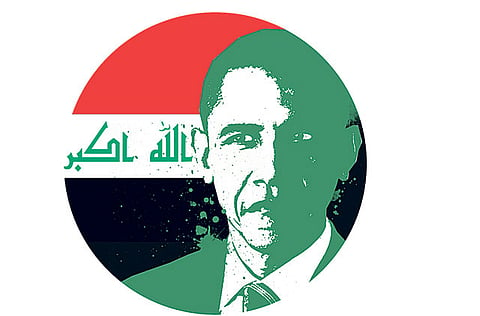Obama is turning his back on Iraq
The US president is grasping at anything that might hold up his plunging popularity

In his haste to withdraw America's remaining combat troops from Iraq, President Barack Obama appears to have overlooked one rather vital consideration. The Iraqis are desperate for them to stay.
Iraq might be a very different place today from the country that was oppressed by Saddam Hussein's dictatorship, but it still has some way to go before it completes the transition to the functioning democracy the majority of Iraqis crave. When Tariq Aziz, Saddam's former apologist-in-chief, issues a stark warning from his Baghdad prison cell that his country will be thrown to the wolves if the Americans leave, we should all take notice.
Five months after Iraq's general election, the main political parties are still arguing over who should form the new government. This political vacuum has been filled with an upsurge in the sectarian violence that has plagued the country since Saddam's overthrow in the spring of 2003. Consequently, more civilians are being killed in Iraq today than in Afghanistan. The Iraqi authorities say 535 people were killed last month alone — the highest casualty rate for two years — while the eerie black and yellow emblem of Al Qaida has made an unwelcome return to the streets of downtown Baghdad.
But none of this appears to have made much of an impression on Obama. No matter that a stable Iraq is vital to Washington's long-term strategic interests in the region: the American president remains determined to fulfil his pledge, made shortly before taking office, that he would end America's military involvement in the country this summer.
There are no prizes for guessing why Obama is so keen to bring home the 90,000 remaining US combat troops. Faced with the distinct possibility of political humiliation in November's mid-term elections, the president is desperately grasping at anything that might shore up his plunging popularity ratings. And on that score Iraq ticks all the boxes.
Obama's political strategists have convinced themselves that the best way to counter the resurgent Republicans is to revive memories of the Bush era, from the calamitous damage the former president's policies are said to have inflicted on the American economy to his zealous prosecution of the war on terror.
Election ploy
American support for the Iraq war has collapsed from its high point seven years ago, when the overwhelming majority of Americans cheered George W. Bush's decision to overthrow Saddam. The disastrous post-Saddam management of Iraq, together with deeply unedifying episodes such as the Abu Ghraib prison scandal, have resulted in two thirds of Americans now opposing the war. Indeed, Obama picked up many votes during the presidential election contest by issuing constant reminders that he was one of the few Democrat senators to oppose what he referred to as a "dumb war". He clearly believes he can repeat the trick by ending American combat operations before campaigning begins in earnest.
To ensure that Al Qaida in Iraq remains a minority cult, it would make sense for Washington to begin its withdrawal of combat forces only once a new government has taken office in Baghdad and has demonstrated its ability to protect the nation against malicious neighbours and deluded terrorists. This would also ensure that Iraq could finally concentrate its resources on exploiting the massive oil reserves that could one day transform the international energy market in the West's favour.
But Obama is too fixated on his short-term political prospects to take such a statesman-like approach. As a consequence, as Aziz eloquently argues, he risks sacrificing all the hard-won gains western forces have made during the past seven years, with all the implications that would have for the future of the transatlantic alliance.
The brutal reality, of course, is that this debate is redundant if, as seems likely, Obama has already decided on a cut-and-run strategy for Afghanistan, as well as in Iraq. Britain and the other major European Nato states simply do not have the resources to sustain a military campaign of this magnitude without American backing. And then there is the question of whether the Nato alliance will survive such an ignominious end to a mission that began with such high hopes.



